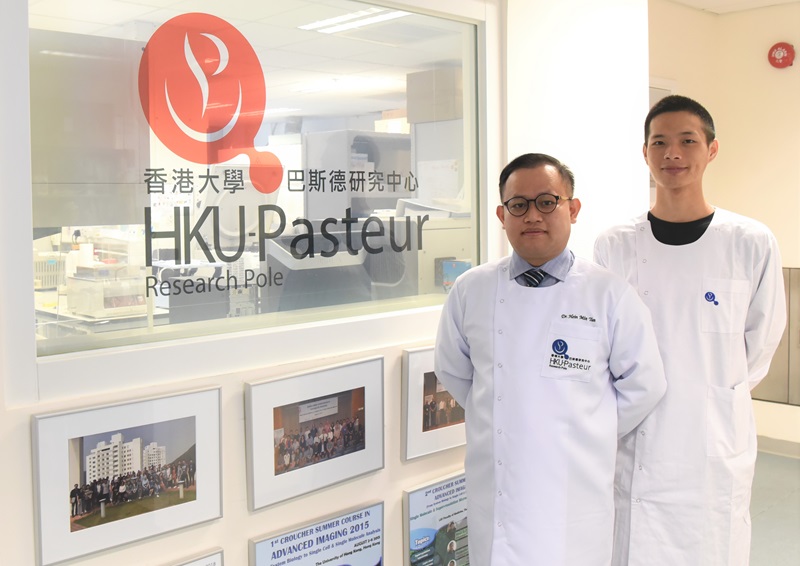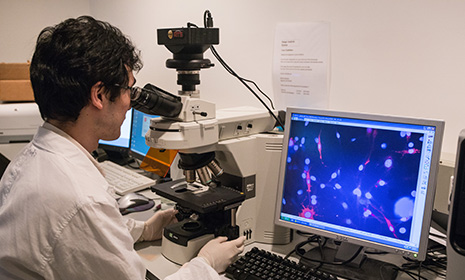HKUMed discovers a causal link among food allergies, gut microbiota development in infancy, birth methods and mother’s ethnicity
Researchers from HKU-Pasteur Research Pole (HKU-PRP) at the School of Public Health, LKS Faculty of Medicine of The University of Hong Kong (HKUMed), in collaboration with their Canadian collaborators, discovered for the first time a causal link between caesarean section birth, delayed gut microbiota development (persistently low Bacteroides, high Proteobacteria and colonised with Clostridium difficile) and peanut sensitivity in infants. In addition, the effect is also found to be almost four times as more pronounced in children of Asian descent than others. The findings are now published in Gastroenterology, a leading peer-reviewed medical journal. [link to the publication]
Research methods and findings
The research team characterised the composition of gut microbiota at three or four months of age and again at one year, using next-generation sequencing (a massively parallel sequencing technology used to determine the order of nucleotides in DNA). They identified four typical trajectories for bacterial development, including one in which the infants had persistently low levels of Bacteroides. It is a type of bacteria known to be critical to immune system development perhaps through the production of sphingolipids, the key to cell development and signalling. This profile was most common in babies born by caesarean section. ‘In general, the level of Bacteroides should increase with age until it becomes adult microbiome. It is an indicator for maturation of gut microbiome in children,’ said Dr Hein M Tun, Assistant Professor of HKU-PRP of School of Public Health, HKUMed.
The infants were given skin prick tests at one and three years of age to assess their reaction to a variety of allergens, including egg, milk, soy and peanut. The babies with low Bacteroides levels were found to have a threefold increase in their risk of developing a peanut sensitivity by aged three — and the risk was eight times higher for babies born to mothers of Asian descent. In the study, 12% of children are born to Asian mothers, mainly Chinese (41.5%), and they have a higher prevalence of peanut sensitisation than Caucasian children (9.4% vs 2.4%).
The team did further mediation analysis to look for causal effects between Asian ethnicity and peanut sensitisation. ‘The analysis provided additional evidence for the causal association with early gut microbiota development that links to caesarean section,’ said Dr Tun, noting it is the first study to identify this link.
Research significance
Despite the relatively low percentage of food allergies among children in Asia, such as Mainland China (more than 6% of children under the age of five)1 and Hong Kong (5-8%)2, the latest HKUMed findings echoed with those of previous studies that Asian children born in Western countries, including Australia, have higher rates of peanut allergy than those born in Asia3.
A multitude of pre-, peri and post-natal factors, including changes in diet, microbial exposure and environment could be the reasons behind. Increasing evidence supports the role of early-life gut microbiota in developing allergic diseases, however, ecological changes of gut microbiota during infancy in relation to, as well as its interaction with host factors in food sensitisation, remain unclear.
‘As the gut microbiota are developing in infancy so is the gut’s immune system, training the gut to react to pathogens and to be tolerant of the food that we require,’ explained Dr Tun. ‘Several factors influence microbial seeding and colonisation in early-life, mainly the method of birth, breastfeeding, exposure to antibiotics and chemical disinfectants, and having siblings and furry pets.’
The best path is to avoid caesarean birth unless it is medically necessary. Asian parents especially those living in Western countries should pay extra attention to the risk of developing Western allergic phenotypes among their children, and they are advised to keep traditional diets, avoid overuse of disinfectants, and keep furry pets. ‘According to the hygiene hypothesis, overly clean environment will hamper the development of children’s immune system and they should expose to more diverse microbes in their first three years of life to prevent from allergic diseases and asthma,’ added Dr Tun.
[1] Renz H, Allen KJ, Sicherer SH, et al. Food allergy. Nat Rev Dis Primers 2018;4:17098.
[2] Society THKA. Pathology and Causes of Food Allergy, 2015.
[3] Wang Y, Allen KJ, Suaini NHA, et al. Asian children living in Australia have a different profile of allergy and anaphylaxis than Australian-born children: A State-wide survey. Clinical & Experimental Allergy 2018;48:1317-1324.
About the research team
The research was conducted by a team led by Dr Hein M Tun, Assistant Professor, HKU-PRP, School of Public Health, HKUMed. The other member of the research team from HKU-PRP was Mr Ye Peng, PhD student. Investigators from the Canadian Healthy Infant Longitudinal Development (CHILD) study were Dr Anita L Kozyrskyj, Dr Bolin Chen, Mr Theodore B Konya, Dr Nadia P Morales-Lizcano, Dr Radha Chari, Dr Catherine J Field, Dr David S Guttman, Dr Allan B Becker, Dr Piush J Mandhane, Dr Theo J Moraes, Dr Malcolm R Sears, Dr Stuart E Turvey, Dr Padmaja Subbarao, Dr Elinor Simons and Dr James A Scott.
Acknowledgements
This research was specifically funded by grant 227312 from the Canadian Institutes of Health Research Canadian Microbiome Initiative (Dr Anita L Kozyrskyj). The Canadian Institutes of Health Research and the Allergy, Genes, and Environment (AllerGen) Network of Centres of Excellence provided core support for the CHILD study. Dr Tun was funded through a Canadian Institutes of Health Research Fellowship and an Alberta Innovates Postdoctoral Fellowship in Health.
About HKU-Pasteur Research Pole
HKU-Pasteur Research Pole (HKU-PRP) is a joint laboratory of HKU and Institut Pasteur, established in 2000 with the aim to developing programmes of excellence in research and education that will generate biological knowledge and advance the understanding and treatment of infectious diseases. HKU-PRP benefits from the outstanding scientific environment offered by the School of Public Health, HKUMed, with its significant contributions, both locally and internationally, to research on emerging viral diseases and improving health. Moreover, HKU-PRP is part of the IP International Network, a unique model for health cooperation to further science, medicine and public health with more than 100 years of history.
http://www.hkupasteur.hku.hk/

Researchers from HKU-Pasteur Research Pole (HKU-PRP) at the School of Public Health, LKS Faculty of Medicine of The University of Hong Kong (HKUMed), in collaboration with their Canadian collaborators, discovered for the first time a causal link between caesarean section birth, delayed gut microbiota development (persistently low Bacteroides, high Proteobacteria and colonised with Clostridium difficile) and peanut sensitivity in infants. The effect is also found to be almost four times as more pronounced in children of Asian descent than others. From left: Dr Hein M Tun, Assistant Professor, HKU-PRP, School of Public Health, HKUMed and Mr Peng Ye, PhD student.








.png)
